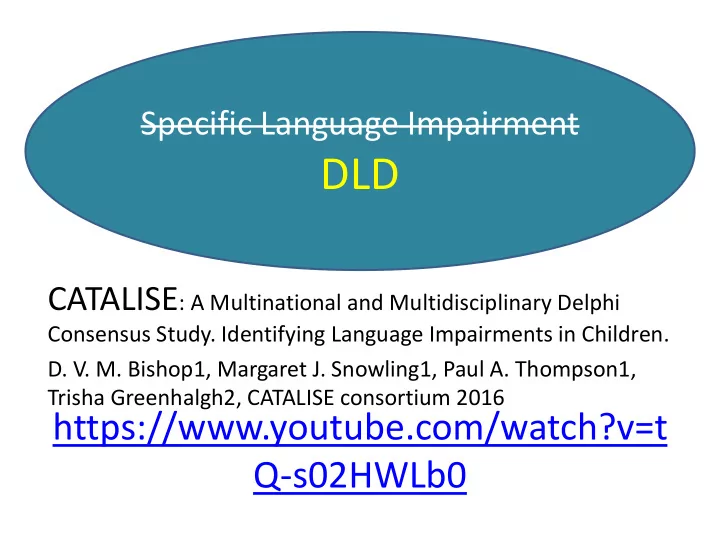

Specific Language Impairment DLD CATALISE : A Multinational and Multidisciplinary Delphi Consensus Study. Identifying Language Impairments in Children. D. V. M. Bishop1, Margaret J. Snowling1, Paul A. Thompson1, Trisha Greenhalgh2, CATALISE consortium 2016 https://www.youtube.com/watch?v=t Q-s02HWLb0
DLD 123 https://www.youtube.com/watch?v=tQ- s02HWLb0
The Taxi driver Test
Why the change? The language we use can affect the services that Children receive Can’t do research without common definitions
Questions we need to answer • Which children should get extra help? • Audit: how many SALTs do we need? • Is rate of language problems increasing/decreasing over time? • How do different countries/region compare? • What causes children’s language problems? Adapted from D Bishop March 2018
SLCN DLD e.g. e.g. speech ASC sound disorders 7.6% • verbal learning / memory • syntax • semantics • word retrieval • pragmatics • phonology e.g. language e.g. genetic conditions difficulties acquired such as cerebral palsy after brain injury
Biomedical conditions • Language disorder associated with known genetic condition (e.g. Down syndrome, Klinefelter syndrome) • Acquired brain injury • Sensorineural hearing loss • *Intellectual disability • *Autism spectrum disorder * Included because growing evidence of genetic basis for these conditions 58 Adapted from D Bishop March 2018
What is new? • Developmental language disorder (DLD) to replace SLI • Disorder defined in terms of functional impairment and poor prognosis • Rather than exclusionary factors, ‘Language disorder associated with X’ – also need assessment/intervention • Does not use invalid delay/disorder distinction • Does not use social background as criterion • Does not use nonverbal IQ as criterion • Additional disorders as descriptor rather than exclusionary factor 51 Adapted from D Bishop March 2018
What does it mean for provision?
Further Reading and resources https://www.naplic.org.uk/dld/ https://www.youtube.com/watch?v=OZ1dHS1X8jg Bishop DVM, Snowling MJ, Thompson PA, Greenhalgh T, CATALISE consortium (2016) CATALISE: A Multinational and Multidisciplinary Delphi Consensus Study. Identifying Language Impairments in Children. PLoS ONE 11(7): e0158753. doi:10.1371/journal.pone.0158753 CATALISE: a multinational and multidisciplinary Delphi consensus study of problems with language development. Phase 2 Bishop, D. V. M., Snowling, M. J., Thompson, P. A., Greenhalgh, T., & The CATALISE Consortium Summary by Susan Ebbels – revised 13th February 2017 https://www.theguardian.com/science/head-quarters/2017/sep/22/developmental- language-disorder-the-most-common-childhood-condition-youve-never-heard-of
Recommend
More recommend